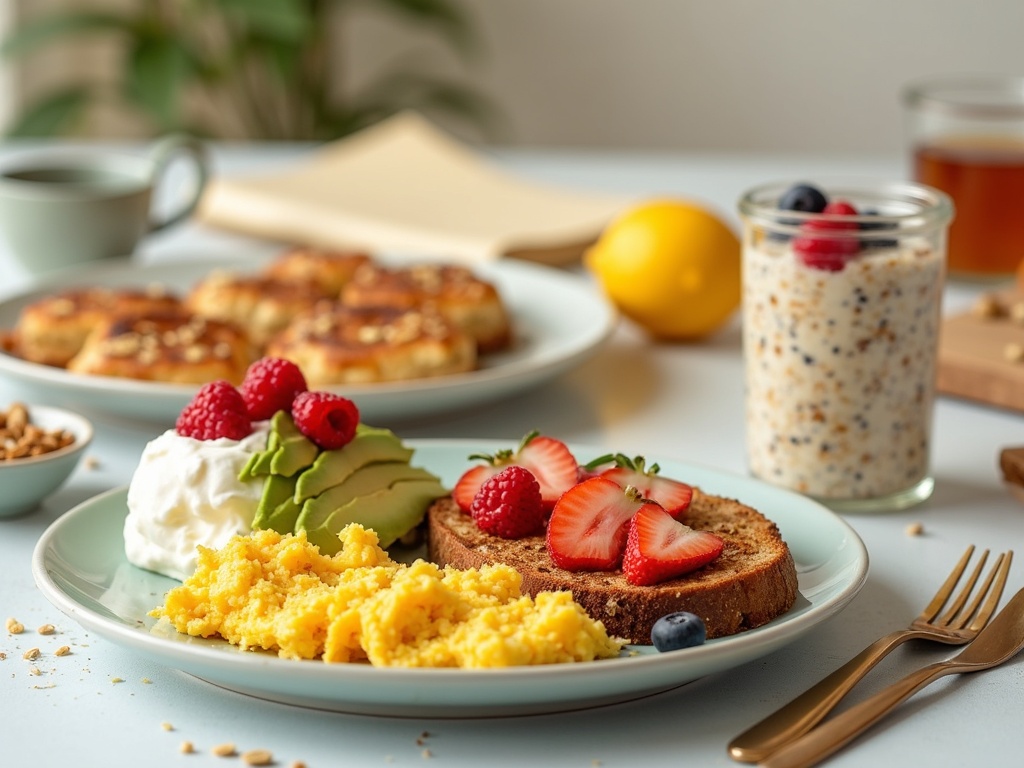Breakfast items serve as the critical first meal that delivers key energy and nutrients to start metabolism and brain function after the overnight fast. Smart breakfast selections prevent mid-morning energy dips, decrease random snacking, and boost daily health outcomes, from classic choices like scrambled eggs to international morning meals.
Find In This Article
Key Takeaways
- A balanced breakfast of 300-500 calories helps maintain steady energy levels and prevents overeating later in the day.
- Protein-rich breakfast foods like eggs, Greek yogurt, and overnight oats provide lasting satiety and support muscle maintenance.
- Quick options such as avocado toast, smoothie bowls, and make-ahead meals make healthy breakfast possible even on busy mornings.
- Global breakfast traditions offer diverse approaches, from protein-focused Japanese meals to carbohydrate-centered French breakfasts.
- Common breakfast mistakes include relying on sugary cereals, neglecting protein and healthy fats, and overlooking portion control.
Why Breakfast Really Matters for Your Health
I often hear my clients confess they’re too busy or simply not hungry in the morning. But did you know that about 30% of U.S. adults regularly skip breakfast? This common habit might seem harmless, but it can significantly impact your overall health and daily performance.
The Science Behind Breakfast Benefits
Breakfast earned its reputation as “the most important meal of the day” for good reason. When you eat a balanced morning meal, you kickstart your metabolism after the overnight fasting period. This early fuel provides immediate energy and sets the tone for your body’s efficiency throughout the day.
Research shows that eating breakfast enhances cognitive function, including memory, concentration, and problem-solving abilities. This is particularly important for school children and adults with mentally demanding jobs. Starting your day with a thoughtful breakfast can make the difference between sluggish thinking and sharp mental performance.
For optimal benefits, aim for a breakfast containing 300-500 calories. This range provides sufficient energy without overloading your system. I find this sweet spot works for most of my clients, giving them lasting energy without feeling weighed down.
Consequences of Skipping Your Morning Meal
When you skip breakfast, your body experiences several negative effects:
- Mid-morning energy crashes that impact productivity
- Increased hunger leading to impulsive food choices
- Higher likelihood of overeating at lunch and dinner
- Potential blood sugar fluctuations affecting mood
- Reduced metabolism efficiency throughout the day
These consequences often lead to a cycle that’s hard to break. The good news? Even a small breakfast meal can prevent these issues and set you up for success.
I’ve noticed many clients who claim they “can’t eat in the morning” can adapt to breakfast eating when they start with something light. Your body adjusts to regular meal timing, eventually signaling hunger in the morning once the habit is established.
The breakfast choices you make matter tremendously. Interestingly, 72% of Americans prefer sweet options for their morning meal. While there’s nothing wrong with enjoying some sweetness, I recommend balancing it with protein and fiber for sustained energy.
For those who feel overwhelmed by morning meal prep, high protein overnight oats or other make-ahead options can be game-changers. These prepared meals take the decision-making out of busy mornings while still delivering essential nutrients.
If traditional breakfast foods don’t appeal to you, there’s no rule saying you must eat cereal or eggs. Leftovers, sandwiches, or even healthy breakfast options like smoothies can provide the morning nutrition you need. The key is getting something nutritious into your system to fuel your day.
For those following specific eating plans, options like a keto-friendly breakfast can still deliver the health benefits of morning eating while supporting dietary goals.
Making breakfast a non-negotiable part of your morning routine might take some adjustment, but the payoffs in energy, cognitive function, and overall health make it worth the effort. Your future self will thank you for establishing this powerful health habit.
Power-Packed Ingredients to Start Your Day
Starting my day with the right ingredients has completely transformed my morning routine and energy levels. I’ve discovered several powerhouse foods that deliver maximum nutritional benefits while keeping me full until lunch.
Nutrition Superstars for Breakfast
Eggs stand out as one of the most versatile breakfast foods available. They’re packed with high-quality protein (about 6 grams per egg), plus essential nutrients like vitamin D, B12, and healthy fats. I often prepare them scrambled with vegetables or as an omelet for a satisfying morning meal.
Oatmeal deserves its reputation as a healthy breakfast option. This fiber-rich grain helps lower cholesterol and stabilizes blood sugar levels, preventing those mid-morning energy crashes. I love topping mine with cinnamon and a drizzle of honey for natural sweetness.
Greek yogurt has become a staple in my breakfast rotation. With roughly twice the protein of regular yogurt and beneficial probiotics for gut health, it’s a nutritional powerhouse. I typically pair it with fresh fruit and a sprinkle of nuts for added texture and nutrients.
Berries offer an impressive nutritional profile that’s hard to beat among fruits. I’ve found these breakfast meals additions particularly valuable:
- Strawberries contain more vitamin C than oranges per serving
- Blueberries have some of the highest antioxidant levels of any fruit
- Raspberries provide fiber and vitamin C with relatively low sugar
- Blackberries deliver vitamin K and manganese alongside their antioxidants
Whole grain bread makes an excellent foundation for keto-friendly breakfast alternatives when you choose low-carb varieties. Unlike their refined counterparts, whole grains provide complex carbohydrates that release energy slowly throughout the morning.
For maximum benefit, I’ll often combine several of these ingredients. My favorite combination is high protein overnight oats made with Greek yogurt and topped with fresh berries. This creates a perfectly balanced meal with protein, fiber, and antioxidants.
The key to breakfast success isn’t just about selecting these nutritional powerhouses individually—it’s about creating balanced meals that combine proteins, complex carbs, and healthy fats to fuel your morning properly.
Quick and Easy Breakfast Recipes Anyone Can Make
I’ve found that having a few simple breakfast recipes in my repertoire saves me on busy mornings. These options require minimal ingredients and preparation time but deliver maximum flavor and nutrition to start your day right.
Classic Morning Staples
Scrambled eggs are my go-to when I need something filling in minutes. I whisk 2 eggs with a splash of milk, then cook for 3-5 minutes on medium heat, stirring gently. The key is not to overcook them – I pull them off the heat when they still look slightly wet as they’ll continue cooking in the residual heat.
Perfect oatmeal doesn’t have to be bland. I combine 1 cup of oats with 2 cups of liquid (water, milk, or a combination) and simmer for 5-7 minutes. For extra flavor, I add a dash of cinnamon, a drizzle of honey, or a handful of diced fresh fruit. This breakfast classic keeps me full until lunch.
For a no-cook option, Greek yogurt parfaits can’t be beat. I layer 1 cup of Greek yogurt with fresh berries and 1/4 cup of crunchy granola. This high-protein breakfast provides a nice balance of protein, carbs, and healthy fats.
Elevated Basics
Avocado toast has become a modern breakfast classic for good reason. I mash ripe avocado onto toasted whole grain bread, then add a sprinkle of salt and red pepper flakes. For extra protein, I sometimes top it with a perfectly poached egg. This healthy breakfast option comes together in minutes but feels like something from a café.
The success of these simple recipes often comes down to timing and temperature. For instance:
- Scrambled eggs become rubbery when cooked too long
- Oatmeal needs enough time to soften but can become gluey if overcooked
- Toast should be golden brown, not burnt or underdone
- Poached eggs need water just below simmer (about 180°F) for 3-4 minutes
I’ve found that paying attention to these details transforms basic breakfast foods into something special. Even on hectic mornings, taking those extra 30 seconds to properly time cooking makes all the difference between a mediocre meal and a delicious one.
These recipes are endlessly adaptable too. Once I mastered the basic versions, I started experimenting with different spices, toppings, and mix-ins to create breakfast meals that never get boring. From keto-friendly breakfast versions (using full-fat yogurt and limiting higher-carb ingredients) to more indulgent weekend variations, these foundational recipes serve as perfect starting points.
Modern Breakfast Variations to Try
Breakfast doesn’t have to be boring or predictable. I’ve discovered several innovative morning meal options that can transform your breakfast routine while providing excellent nutrition. These modern variations offer something for everyone, whether you prefer sweet or savory flavors to start your day.
Nutrient-Packed Bowl Options
Smoothie bowls have revolutionized how I think about breakfast entirely. Unlike regular smoothies, these thicker concoctions serve as the perfect canvas for nutritious toppings. I create mine with a base of frozen fruits (bananas work wonderfully), a handful of spinach (which you barely taste), and Greek yogurt for protein. The magic happens with the toppings – sliced almonds, walnuts, fresh berries, and a sprinkle of chia seeds add texture and additional nutrients.
Overnight oats have saved my mornings countless times. This high-protein overnight oats option requires minimal morning effort since you prepare everything the night before. I combine rolled oats with almond milk, chia seeds, a touch of honey, and sometimes a scoop of protein powder, then let it sit in the refrigerator overnight. By morning, I have a ready-to-eat, creamy breakfast that keeps me full for hours.
Savory breakfast bowls offer a fantastic alternative to sweeter options. I start with a quinoa base (which cooks quickly) and top it with sautéed vegetables like bell peppers, mushrooms, and spinach. A perfectly cooked egg – either poached or fried with a runny yolk – finishes the bowl beautifully. The combination provides complex carbohydrates, protein, and vegetables all in one satisfying meal.
Global Breakfast Inspirations
Looking beyond traditional Western breakfast foods, many cultures offer morning meals that might seem unconventional but deliver amazing flavors and nutrition. Japanese breakfasts featuring miso soup, steamed rice, grilled fish, and pickled vegetables provide a balanced start with protein and fermented foods that support gut health.
Middle Eastern breakfast spreads often include hummus, fava beans, olives, cucumber, tomatoes, and whole grain bread. This plant-forward approach delivers fiber, healthy fats, and protein without relying on processed foods.
Mexican breakfast options like chilaquiles (lightly fried corn tortillas simmered in salsa and topped with eggs) or simple bean and vegetable-filled breakfast tacos offer bold flavors and lasting energy.
I’ve found that exploring these international breakfast meals has broadened my palate while introducing more variety into my morning routine.
For those with dietary restrictions, modern breakfast variations shine particularly bright. Here are some accommodations that don’t sacrifice taste:
- Gluten-free options: Quinoa porridge, rice-based congee, or gluten-free oats provide hearty alternatives to wheat-based cereals
- Vegan choices: Tofu scrambles with nutritional yeast, plant-based yogurt bowls, or avocado toast on gluten-free bread
- Keto-friendly breakfast items: Avocado halves filled with eggs and baked, or chia pudding made with full-fat coconut milk
- Dairy-free alternatives: Coconut yogurt parfaits or breakfast bowls using plant milks like oat, almond, or coconut
The beauty of these modern variations lies in their flexibility. I can easily adjust ingredients based on what’s available, my mood, or specific nutritional needs. Many of these healthy breakfast options also work well for meal prep, making busy mornings much more manageable.
By incorporating these contemporary breakfast ideas into your routine, you’ll discover that the first meal of the day can be both exciting and nourishing. The right morning meal sets the tone for your entire day, providing sustained energy and satisfaction that carries you through until lunch.
Common Breakfast Mistakes to Avoid
I’ve seen many people start their day on the wrong foot with breakfast choices that don’t serve their bodies well. Making thoughtful decisions about your morning meal can set the tone for your entire day.
Poor Nutritional Choices
Relying heavily on sugary cereals is one of the biggest mistakes I notice in morning routines. These products might taste delicious, but they cause rapid blood sugar spikes followed by crashes that leave you hungry and irritable long before lunch. Instead, I recommend choosing healthy breakfast options that provide sustained energy.
Not including enough protein and healthy fats is another common error. These nutrients are crucial for feeling satisfied and maintaining steady energy levels. Try incorporating eggs, Greek yogurt, nuts, or avocado into your breakfast routine for better nutritional balance.
Skipping breakfast entirely affects your energy and eating patterns throughout the day. While intermittent fasting works for some, many people find that missing morning nourishment leads to overeating later. If you’re pressed for time, high-protein overnight oats can be prepared the night before for a quick grab-and-go option.
Planning and Portion Issues
Overlooking balanced macronutrients can shortchange your morning nutrition. A complete breakfast meal should include carbohydrates for energy, protein for satiety, and healthy fats for nutrient absorption. This balance helps maintain steady blood sugar and keeps hunger at bay until your next meal.
Ignoring portion control is easy to do, especially with delicious breakfast foods like pancakes or granola. Even healthy options can contribute to weight gain when consumed in large quantities. I suggest using smaller plates and being mindful of serving sizes, particularly with calorie-dense items like nut butters, granola, and cooking oils.
For those following specific dietary approaches, overlooking specialized options like keto-friendly breakfast choices can derail your nutritional goals. Each eating style requires thoughtful planning to ensure you’re getting appropriate nutrition while sticking to your preferred approach.
By avoiding these common mistakes, you’ll transform your morning meal from a potential dietary pitfall into a powerful tool for health, energy, and satisfaction throughout your day.

Global Breakfast Traditions and Health Considerations
Breakfast traditions vary dramatically around the world, each reflecting cultural values and local ingredients. I’ve discovered that what constitutes a “proper breakfast” differs significantly from country to country, influencing how people start their day globally.
Diverse Breakfast Traditions Worldwide
Japanese breakfast traditions stand in stark contrast to Western morning meals. Rather than sweet options, Japanese breakfast typically features savory components like steamed rice, grilled fish, miso soup, and nori seaweed. This protein-rich, balanced approach provides sustained energy throughout the morning hours.
Meanwhile, French breakfast culture celebrates simplicity and indulgence simultaneously. The classic French morning routine often centers around fresh pastries like croissants and pain au chocolat, typically accompanied by a strong café au lait. Unlike the protein-focused Japanese approach, French breakfast emphasizes carbohydrates and smaller portions.
Moving beyond these examples, breakfast diversity extends to countless regional variations:
- Mexican breakfast often features spicy egg dishes like huevos rancheros
- Indian morning meals might include savory dosas or idlis with chutney
- Traditional English breakfast incorporates eggs, beans, toast, and grilled tomatoes
- Middle Eastern breakfast spreads feature flatbreads, hummus, olives, and cheeses
These cultural differences highlight how breakfast foods evolve based on climate, available ingredients, and cultural attitudes toward the first meal of the day.
Nutritional Considerations Across Breakfast Styles
Despite this diversity, nutritional balance remains crucial regardless of cultural tradition. I’ve found that the most satisfying breakfast meals incorporate varied food groups to provide lasting energy. Ideally, morning meals should include:
- Protein sources help maintain muscle mass and provide satiety. Options range from eggs and yogurt to plant-based alternatives like tofu or legumes. For those seeking high-protein options, high protein overnight oats offer convenience with nutritional benefits.
- Complex carbohydrates deliver sustainable energy and fiber. Whole grains like oats, quinoa, and whole wheat bread digest more slowly than refined alternatives, preventing mid-morning energy crashes common with sugary breakfast items.
- Healthy fats from sources like avocados, nuts, or olive oil support brain function and hormone production while contributing to meal satisfaction. Even keto-friendly breakfast options can incorporate these beneficial fats while limiting carbohydrates.
- Fruits and vegetables provide essential vitamins, minerals, and fiber. Adding produce to breakfast increases nutrient density and helps meet daily vegetable recommendations that many people struggle to achieve.
Dietary restrictions increasingly influence breakfast choices globally. Food allergies, religious considerations, ethical choices, and health-related diets shape what appears on morning plates. For those with specific needs, healthy breakfast options can be adapted across cultural styles while honoring restrictions.
Cultural breakfast traditions offer valuable lessons about balance, seasonality, and the importance of starting the day mindfully. Rather than dismissing unfamiliar breakfast approaches, I’ve found inspiration in global traditions to create more satisfying morning meals that combine nutritional wisdom with cultural appreciation.
By exploring diverse breakfast traditions, we gain perspective on different approaches to health, pleasure, and cultural expression through the first meal of the day.

Sources:
Harvard T.H. Chan School of Public Health, The Nutrition Source: Breakfast
YouGov, American Breakfast Preferences

